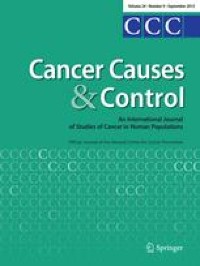Abstract
Purpose
Among healthy postmenopausal women, levels of CA125 and CA15.3 are influenced by demographic and reproductive factors, including race/ethnicity. In this study, we sought to examine the interaction between race/ethnicity and other correlates of these biomarkers and whether the racial differences observed are simply determined by other correlates with racial differences.
Methods
In archived sera from 946 postmenopausal women who participated in the 2001–2002 cycle of the National Health and Nutrition Examination Survey, we measured CA125 and CA15.3 and examined their associations with health survey and examination data available in this cohort. We used multivariable linear regression to examine the association between CA125 and CA15.3 and race/ethnicity. We then calculated geometric means of these markers by demographic and reproductive factors stratified by race/ethnicity and used likelihood ratio tests to evaluate heterogeneity.
Results
Non-white race was associated with lower CA125, with Non-Hispanic Black women being associated with − 29.0% (95% CI − 42.5%, − 12.2%) difference and Mexican American women being associated with − 6.4% (95% CI − 18.1%, 6.9%) difference on average compared to Non-Hispanic White women. Associations between CA125 and age and parity varied by race/ethnicity. Non-Hispanic Black women were associated with higher CA15.3 compared to Non-Hispanic White women, with 17.3% (95% CI − 0.5%, 38.3%) differences on average. Associations between CA15.3 and age, number of births, and age at natural menopause varied by race/ethnicity.
Conclusions
Among postmenopausal women, Non-Hispanic Black women were associated with lower CA125 and higher CA15.3 levels compared to Non-Hispanic White women. Our results support that race/ethnicity should be considered when assigning thresholds for these biomarkers being tested for diagnostic or screening purposes.



Δεν υπάρχουν σχόλια:
Δημοσίευση σχολίου
Σημείωση: Μόνο ένα μέλος αυτού του ιστολογίου μπορεί να αναρτήσει σχόλιο.